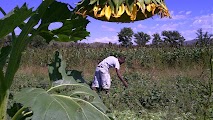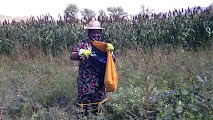Walking
through the center of the bustle at Tucson Meet Yourself in search of
an Iskashitaa banner, an overwhelming wave of smells, sounds and
movement

crashed
my sense of focus. It didn't take me long to find what I was looking
for: the Iskashitaa crafts tables in the Folk Arts and Global Market
center. Covered with hand-woven baskets, palm leaves, scarves, and other
vibrant merchandise, the color-blasted tables were not hard to miss,
much less the smiling and welcoming faces of the Iskashitaa members.
I
introduced myself to the craft-makers and asked about their work. After
learning about the patient skill behind the palm-frond and recycled
plastic baskets, my interest directed itself towards the only child at
the table. Expecting a shy character, I was surprised when she jumped at
the questions directed towards her. Wondering which method she used to
make the colorful scarves, she offered to teach me how she finger weaves
each one, putting a whole new meaning behind the phrase "made by hand."

Watching her wrap the yarn around my fingers, I began to ask her about
herself and how she came to be the sweet Nepalese teen teaching the
silly American girl how to make her own clothes. Originally from Bhutan,
fifteen year-old Krishna told me about her family's journey.
A
sophomore at Catalina High School, Krishna came to Tucson with her
brother, sister, and mother in March of 2010. Before coming to America,
Krishna's family spent 18 years in a refugee camp in Nepal.
"So why did you come here?" I asked her.
"Why?
To have a better education, and to live in peace, freedom..." A nice
answer, of course, but an expected answer, almost rehearsed. I wanted to
know more, if the stereotypical belief that everyone wants to come to
America is a falsifiable truth, or if obtaining the real answer is like
drilling someone at a poker table. I drilled anyway.
"Did you always want to come to America or did it just turn out that way?"
"It
just happened," she admitted. "We were in refugee camp for 18 years....
People from Bhutan start war and they came (to Nepal) to run away. I
stayed in refugee camp for 11 years but them (her family) they stay for
like 18 or 19."
Due
to the rising population of the Nepali-speaking minority in Bhutan,
King Jigme Singye Wangchuck began a policy that resulted in the
expulsion of roughly 100,000 members of the ethnic minority from the
1980s to 1990s by the Royal Ghutan Army. By 2010, around 40,000
Bhutanese refugees in camps in Nepal were resettled in Western countries
like the United States due to Bhutan's refusal to allow the return of
its citizens (Subba and Mishra 2010). According to a relative 1995
article in the academic journal Pakistan Horizon, the "pro-democracy
protests in Thiumphu, a corollary of the democratic movement in Nepal,
seem to have triggered the eviction of the ethnic Nepalese from Bhutan"
(Shakoor 1995: 33).
"Do you ever want to go back?" I inquired.
"Maybe...
probably not" Krishna replied, a serious look on her face. But when
asked about the future, her positivism remained undimmed. "I want to go
to U of A. I want to be a doctor."
"What kind of doctor"
"Family doctor? Or Dentist? My sister wants to be a nurse, yeah and my brother's study nurse now."
As I continued to weave the scarf on my own, I asked, "So how do you learn to finger weave?"
"Her."
She gestured to the women to her right weaving a scarf of her own. "My
cousin." Brought to attention, the women I now knew to be named Pompa
joined our casual banter, although her limited English produced Krishna
as our on-deck carrier pigeon.
"So when did you come here, to Tucson? I asked.
"Uh, I came 2009. March."
"Before Krishna?" I asked for clarification.
"Yes before Krishna."
"And you're originally from Bhutan?
"Yes,
yes my country is Bhutan," Pompa answered with an air of pride. When
asked about anything related to her experience in Tucson, she would
answer simply, "Yes, I like United States," as her face lit up in a
smile. Although details were difficult to extract due to the language
barrier, the message was clear; her resettlement experience has been a
positive one. "It's difficult because the system I think is good and law
here is good. Two things I don't like." With the help of Krishna's
translations, Pompa then went on to describe her dislike of the common
attire by the students at schools in Tucson and the normalcy of street
smokers, a lighthearted air to her disapproval.
Resulting
in a similar reaction, any questions about their involvement with
Iskashitaa Refugee Network, or anything related to Iskashitaa for that
matter, produced Pompa's repeated remark, "Too much help, Iskashitaa,
too much help, Barbara" Their positive reaction towards Iskashitaa's
programs and presence in their lives was undeniable. Krishna elaborated
for her cousin, explaining how Iskashitaa provides fabric to make
clothes, supplies to make the merchandise they sell at local events such
as this festival, and helps her communicate with people in the
community. Along with supplies, Pompa also acquires much of her produce
from Iskashitaa harvests, including "apples, oranges, pomegranate..."
she added with another bright smile.
As
I continued my finger weaving, Krishna noticed my length, wrapped one
end around my neck and said, "Maybe a little bit more. It's good."
Pompa
may not think of America or Tucson as her home, at least not in the way
that she thinks of Bhutan as her home, but she appeared happier than
most people I know. A constant expression of complacent contentedness
rested on her face in the time I spent with her. Other than the expected
anxiousness one feels after spending a long day in the heat, Krishna
seemed happy too. A feeling that may have been harder to come by without
a community, a home, to call her own-a community whose doors were
undoubtedly opened through the Iskashitaa Refugee Network.
-Kayla Halsey, Journalism Intern









 crashed
my sense of focus. It didn't take me long to find what I was looking
for: the Iskashitaa crafts tables in the Folk Arts and Global Market
center. Covered with hand-woven baskets, palm leaves, scarves, and other
vibrant merchandise, the color-blasted tables were not hard to miss,
much less the smiling and welcoming faces of the Iskashitaa members.
crashed
my sense of focus. It didn't take me long to find what I was looking
for: the Iskashitaa crafts tables in the Folk Arts and Global Market
center. Covered with hand-woven baskets, palm leaves, scarves, and other
vibrant merchandise, the color-blasted tables were not hard to miss,
much less the smiling and welcoming faces of the Iskashitaa members. Watching her wrap the yarn around my fingers, I began to ask her about
herself and how she came to be the sweet Nepalese teen teaching the
silly American girl how to make her own clothes. Originally from Bhutan,
fifteen year-old Krishna told me about her family's journey.
Watching her wrap the yarn around my fingers, I began to ask her about
herself and how she came to be the sweet Nepalese teen teaching the
silly American girl how to make her own clothes. Originally from Bhutan,
fifteen year-old Krishna told me about her family's journey.









 n
the Main Library and low-rider exhibits, will also feature refugee
talent. Refugee cooks, including Afghani, Bhutanese, Congolese,
Eritrean, Iraqi and Russian women, will demonstrate dishes taught to
them by their mothers and grandmothers. Samples and recipes will be
shared, allowing everyone a taste of these traditional foods. With a
table anchoring a corner of the "Heritage Food Pavilion",
Iskashitaa will also be well-positioned to retail our newly expanded
line of specialty products, among them hot lime pomegranate marmalade,
hot chile mango sauce, mesquite syrup and garlic in olive oil.
n
the Main Library and low-rider exhibits, will also feature refugee
talent. Refugee cooks, including Afghani, Bhutanese, Congolese,
Eritrean, Iraqi and Russian women, will demonstrate dishes taught to
them by their mothers and grandmothers. Samples and recipes will be
shared, allowing everyone a taste of these traditional foods. With a
table anchoring a corner of the "Heritage Food Pavilion",
Iskashitaa will also be well-positioned to retail our newly expanded
line of specialty products, among them hot lime pomegranate marmalade,
hot chile mango sauce, mesquite syrup and garlic in olive oil.









